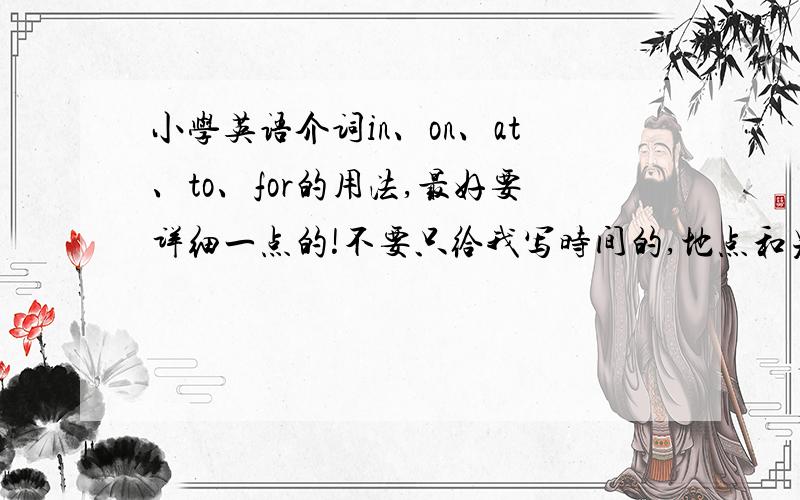小学英语介词in、on、at、to、for的用法,最好要详细一点的!不要只给我写时间的,地点和另外方面的都写出来该怎么用
来源:学生作业帮助网 编辑:作业帮 时间:2024/05/06 14:25:29

小学英语介词in、on、at、to、for的用法,最好要详细一点的!不要只给我写时间的,地点和另外方面的都写出来该怎么用
小学英语介词in、on、at、to、for的用法,最好要详细一点的!
不要只给我写时间的,地点和另外方面的都写出来该怎么用
小学英语介词in、on、at、to、for的用法,最好要详细一点的!不要只给我写时间的,地点和另外方面的都写出来该怎么用
小学英语总复习
小学英语介词总结
介词(Preposition)
一、 概述
介词是英语中很活跃的词,一般置于名词之前.它常和名词或名词性词语构成介词短语.同一个介词常和不同的词语搭配形成固定搭配,表示不同意义.
二、 常用介词的基本用法
at
①表示时间: I go to school at seven every day 我每天早上7点去上学.
②表示在某一具体地点: He is standing at the bus stop 他站在公共汽车站.
③表示动作的方向、目标: Let me have a look at the picture 让我看看这幅图.
④用于某些固定搭配: at once 立刻、马上 at last 最后
at the same time 同时 at first 开始时
not at all 一点也不
about
①表示大约时间: I's about six o'clock now. 现在大约6点钟了.
②表示地点;在……周围: Everthing about me is so beautiful 我周围的一切都那么美好.
③关于,对于: We are talking about the news. 我们正在谈论新闻.
after
①在……之后: After dinner I watch TV. 晚饭后我看电视.
②在……后面: He came into the room after me. 他在我后面进了房间.
behind
①在……之后: There is a bike behind the tree. 树后有一辆自行车
②比……晚,迟于: The train is behind time. 火车晚点了
by
①在……旁: He is sitting by the bed. 他正坐在床边.
②到……时候: We have learned three English songs by now. 到现在为止,我们已经学会了三首英文歌曲.
③以……方式: I go to school by bus. 我乘公共汽车去上学.
④用于某些固定搭配: one by one 一个接一个 by the way 顺便说一句
for
①为,给,替: I'll make a card for my teacher. 我要给老师做张卡片.
②由于: Thank you for helping me. 谢谢你帮我.
③表示给(某人)用的: There is letter for you. 这儿有你一封信.
in
①在……里面: The pencil is in the desk. 铅笔在课桌里.
②在一段时间里: We have four classes in the morning. 我们上午有四节课.
③用,以: What's this in English? 这用英语怎么说?
④在某一年份,季节,月份: in 2002, in spring, in January
⑤表示状态,服饰: Helen is in yellow. 海伦身穿黄色衣服.
⑥在……方面: He is weak in English. 他的英语不行.
⑦用于某些固定搭配: in front of 在……前面
in the end 最后
in time 及时
like
①像……样: He looks like his father. 他像他的父亲.
②这样,那样: Don't look at me like that. 别那样看着我.
③怎样: What's the weather like? 天气怎样.
near
靠近,在……附近: My bed is near the window. 我的床在窗户旁.
of
①的(表示所属关系): This is a photo of my family. 这是一张我家的照片.
②……的(用于所有格): He is a friend of mine. 他是我的一个朋友.
③表示数量(与连词连用): One of us is from Beijing. 我们中有一个来自北京
④想到,谈到: I often think of them. 我常常想到他们.
⑤用于某些固定搭配: of course 当然
because of 因为,由于
on
①在……上面: There are some apple on the tree. 树上有些苹果.
②在(星期)天,在某天的上午(下午,晚上): They go to English class on Sunday. 星期天他们去上英语课.
I left Beijing on the morning of May 1. 我在5月1日早上离开北京.
③用于某些固定搭配: on duty 值日 on time 准时
over
①在……正上方: There is a lamp over the table. 桌子上方有一盏灯.
②遍及,穿过: There is a bridge over the river. 有座桥横跨那条河.
③超过,不止: She is a little over 2. 她两岁多了.
to
①到,往,向: He walks to the window. 他走向窗户.
②表示时间、数量,
到……为止 Please count from ten to thirty. 请从10数到30.
③向,对,给: Happy New Year to you all. 大家新年好.
under
What's under your desk? 你书桌底下是什么?
with
①和,写: Could you go home with me? 你能和我一起回家吗?
②表示伴随状态,带有: Who's that girl with glasses? 那位戴眼睛的女孩是谁?
三、 介词的固定搭配
1)介词和名词的连用 2)动词和介词的连用
at arrive at/in 到达
at first 起初;开始 get off 下车
at last 最后 help sb. With sth. 帮组某人做某事
at school 在上课,在上学 ask for 请求
at the moment 此刻 get up 起床
at home 在家;无拘束 laugh at 嘲笑
at present 现在 learn from 向……学习
at work 上班,在工作 look after 照顾
at the same time 同时 look for 寻找
think for 想到
on worry about 担心
on duty 值日 listen to 听
on holiday 度假 look at 看;注视
on time 准时 talk about 交谈;谈
on the left/right 在左/右边 wait for 等候;等
on the radio 在广播中 thank for 为……而感谢
on foot 步行
on sale 出售;降价出售 3)形容词和介词连用
on TV 在电视上播放 be afraid of 害怕
on the phone 在电话中 be careful with 小心;关心
on the way 在路上 be interested in 对……感兴趣
be good at 善于
in be proud of 感到自豪
in all 总体 be crazy about 酷爱
in class 在课堂上 be late for 干某事迟到
in English 用英语 be good for 对……有利
in short 总之 4)其他
in a hurry 匆忙地 by+交通工具
in the end 最后 by bus/train/plane/air/ship/bike/sea/land…
in bed 躺在床上 lots of/a lot of 许多,大量
in danger 在危险中 at most 至多
in fact 事实上 at least 至少
in time 及时地 at once 立刻;马上
in a minute 立刻 in order to 为了
全是介词,搜介词就能找到用法 希望采纳
介词in,on与at都可用于表示时间的名词前,但用法各不相同,其区别在于:
一、用in的场合
(1)表示“在某年/月/季节”这个含义时,须用介词in。例如:
She came to this city in 1980.他于1980年来到这个城市。
It often rains here in summer.夏天这里常常下雨。
(2)表示“从现在起一...
全部展开
介词in,on与at都可用于表示时间的名词前,但用法各不相同,其区别在于:
一、用in的场合
(1)表示“在某年/月/季节”这个含义时,须用介词in。例如:
She came to this city in 1980.他于1980年来到这个城市。
It often rains here in summer.夏天这里常常下雨。
(2)表示“从现在起一段时间以后”时,须用介词in。例如:
They will go to see you in a week.他们将在一周后去看望你。
I will be back in a month.我将在一个月后回来。
(3)表示“在某世纪”时,须用介词in.例如:
This machine was invented in the eighteenth century.这台机器是在18世纪发明的.
Great changes took place in the twentieth century.20世纪发生了巨大变化.
(4)表示“在某年代或特定世纪某年代”时,须用介词in。例如:
This incident happened in the 1970''''s.该事件发生在20世纪70年代。
The Anti-Japanese War broke out in the 1930''''s.抗日战争爆发于20世纪30年代。
除此之外,morning / evening / afternoon 三个词也常跟介词in连用。例如:
Don't watch TV too much in the evening.晚上看电视不要太多。
They sometimes play games in the afternoon.他们有时在下午做游戏。
二、用on的场合
(1)表示“在具体的某一天”或“(在具体的某一天的)早上、中午、晚上”等,须用介词on。例如:
Jack was born on May 10th,1982.杰克生于1982年5月10日。
They left on a rainy morning.他们是在一个雨天的早上离开的。
He went back to America on a summer afternoon.他于一个夏天的下午返回了美国。
(2)表示“在星期几”或“在星期几的早上、中午、晚上”等,须用介词on。例如:
We don't go to school on Saturday and Sunday.我们星期六和星期天不上学。
What time do you get up on weekdays?你在平日什么时候起床?
I heard this story on Saturday morning.我是在星期六的早晨听到这个故事的。
(3)表示“在某一节日”时,须用介词on。例如:
We usually eat mooncakes on Mid-autumn Festival.我们通常在中秋节吃月饼。
Mr Hu received a card on Teachers''''Day.胡老师在教师节那天收到了一张卡片。
注意:当morning,evening,afternoon被of短语修饰,习惯上用in,而不用on.例如:
in the early morning of September 10th 在9月10的清晨;in the late afternoon of September 12th 在9月12日的傍晚。
三、用at的场合
(1)表示“某一具体时刻(即几点几分时)”,须用介词at。例如:
He gets up at six o''''clock every day .他每天六点起床。
I got home at five thirty yesterday afternoon.我昨天下午五点半到家。
(2)用在特定的时候(时节、时机)时,须用介词at。例如:
They were happy at that time.他们那时很幸福。
I think the shop is clcsed at this time of day.我认为商店在白天的这个时候关门了。
(3)表示“在中午、在夜晚、在周末”时,须用介词at。例如:
What do you often do at noon?你中午经常做些什么?
You can see many stars in the sky at night.夜晚你能看到天空中有许多星星。
(4)表示“在……岁”时,须用介词at。例如:
At the age of nine ,the boy could swim well.在九岁的时候,这孩子就游泳游得很好了。
At the age of twenty,I began to teach English at this school.在二十岁的时候,我就开始在这所学校教英语了。
注意:在含有next ,last,this,one ,any, each, every , some, all的词组和tomorrow,yesterday, the day after tomorrow, the day before yesterday 前不用任何介词。例如:
What did you do last summer holidays?去年暑假你做了些什么?
What are you going to do the day after tomorrow?后天你打算做什么?
收起